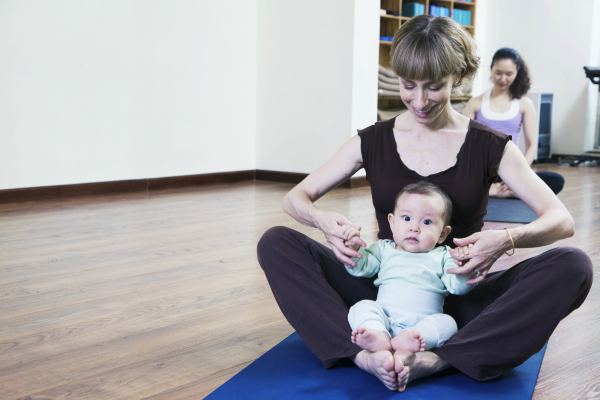
Most babies learn to sit up on their own between the ages of six and eight months. Sitting up requires a lot of upper body strength and coordination. Once your baby’s neck and back muscles are strong enough, which is usually around three to six months, they will be able to roll over on their own and sit up with some support from a pillow or caregiver. Your baby will likely learn to sit up first with assistance, and gradually start to do it on their own.
Sitting Up with Support

Before your baby can sit up, they need to have a strong upper body and good control of the head and neck. Infants naturally have weak head and neck muscles, which is why they need your help to support the neck when being held. As they get little older and start spending more time on their tummy, the upper body starts getting stronger. By the time they are a few months old, they may be able to start sitting up if propped in the corner of a couch—but they will be floppy and may not be able to stay in this position for long before toppling over. Still, sitting up with support is good for them and will help them learn to use muscles as well as develop a sense of balance.
Sitting Up without Support
Once your baby’s had a little practice lifting their head and chest off the ground, they will be able to start sitting up without support. However, they will need your help at first getting into position and may flop over and use their arms for support. They will probably practice sitting in this tripod position for a while before their back muscles get strong enough to sit upright without losing balance. Eventually, they will learn how to balance on their own and sit up without support—if only for 20-30 seconds before flopping over. With practice, they will get stronger and be able to sit unassisted for longer periods of time. Later, as they get better at rolling over and scooting around, you will be able to place them on their tummy and they will be able to get into a sitting position all on their own.
Tips for Helping Your Baby Learn to Sit Up

There are many things you can do as parent to encourage your child to sit up on their own and encourage their muscle development and strength. You can start by placing your baby in the corner of a couch or large arm chair for them to practice sitting upright in a cushioned and safe environment. If they have trouble balancing, you can use pillows to help support them even more. However, don’t leave your child unattended like this. Watch them to make sure they don’t topple over.
You can also sit on the floor cross-legged with your baby sitting in the middle of your legs. Let them prop themselves against your stomach as they sit up. This will help them to practice balancing and develop a strong neck and back in a safe environment -- while also developing a bond with you as you touch and hold them.
An item you can purchase to assist in developing the skill of sitting up is a Boppy pillow. These u-shaped pillows are great for all kinds of developmental activities from which your child can benefit. (You may even have one already to assist in nursing.) To help your baby build strong back and neck muscles, place the Boppy around your baby as they’re sitting. The pillow will provide extra support and help them keep their balance.
In addition to these methods, you should take care to avoid letting your baby spend a lot of time in a swing or car seat. As you probably know already, swings are great for calming baby. But the more time your baby can spend moving around on their own and developing their muscle strength, the better. Playing on the floor is very important for your baby’s development not only with sitting up, but also with other milestones like crawling and walking.
When Should I Start to Worry about My Baby Not Sitting Up?
Most babies can sit up independently by the time they are eight months old. At around six months, your baby may start sitting in a tripod position using his arms for support, but may not be able to sit upright without flopping over. If your baby is six months old and hasn’t started to sit up with support or seems to be flopping over a lot, you should bring this to the attention of your pediatrician. Keep in mind that children develop at their own pace, but trust your parental instincts. Discussing concerns about your baby’s development with your doctor is encouraged and a healthy practice to keep.
